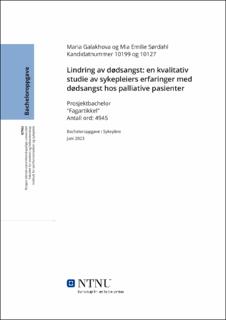Lindring av dødsangst: en kvalitativ studie av sykepleiers erfaringer med dødsangst hos palliative pasienter
Bachelor thesis
Permanent lenke
https://hdl.handle.net/11250/3079406Utgivelsesdato
2023Metadata
Vis full innførselSamlinger
Sammendrag
BakgrunnDenne studien er et samarbeid mellom sykepleierutdanningen ved NTNU og en kommunal palliativ avdeling i Midt-Norge. Ifølge Norsk Sykepleierforbund sine yrkesetiske retningslinjer, skal sykepleier bidra til en naturlig og verdig død, og at pasienten ikke dør alene. Dette er spesielt viktig for palliative pasienter, som er utsatt for å oppleve dødsangst. Formålet med studien er derfor å undersøke sykepleiers erfaringer med å lindre dødsangst hos palliative pasienter.
MetodeDet ble gjennomført en kvalitativ studie med semistrukturerte individuelle intervju for å undersøke sykepleiers erfaringer knyttet til palliativ pleie og dødsangst. Vi intervjuet seks sykepleiere med ulikt antall års erfaring innen feltet. Vi lot oss inspirere av Dallands metode for analyse og tolkning av intervjudata. Dataen ble sortert inn i tre hovedkategorier med tilhørende subkategorier.
ResultaterResultatene viser at sykepleier vektlegger trygging og relasjonsbygging som grunnmuren i lindring av dødsangst. Dette, sammen med både verbal og non-verbal kommunikasjon, medikamenter og inkludering av pårørende, er viktige elementer i å lindre dødsangst hos palliative pasienter. De dro også frem et godt arbeidsmiljø som en viktig forutsetning. Sykepleierne opplevde at de største utfordringene med å lindre dødsangst var å gi håp til pasienter som ikke ønsket å snakke om døden, og mangel på opplæring i kommunikasjon med palliative pasienter.
KonklusjonStudien viser at sykepleier kan bidra til å lindre pasientens dødsangst og legge til rette for at pasienten får en god død gjennom relasjonsbygging og trygging, et godt arbeidsmiljø og fremming av håp. Forskning viser at relasjoner er grunnleggende i palliativ pleie, i tillegg til at opplæring i kommunikasjon legger til rette for best mulig lindring av dødsangst gjennom samtale. I møte med den fremtidige eldrebølgen vil samfunnet trenge mer kunnskap om palliativ pleie og lindring av dødsangst, for å sikre god pleie og mindre forekomst av dødsangst. BackgroundThis study is a collaboration between NTNU and a municipal palliative care department in central Norway. According to the Norwegian Nurses Association's Code of Conduct, nurses must contribute to a natural and dignified death, and that the patient doesn’t die alone. This is particularly important for palliative patients, who are more prone to experience death anxiety. The purpose of the study is therefore to investigate nurses' experiences of alleviating death anxiety in palliative patients.
MethodA qualitative study with semi-structured individual interviews was done to investigate nurses' experiences related to palliative care and death anxiety. We interviewed six nurses with differing years of experience in the field. We were inspired by Dalland's method for analyzing and interpreting data. The data was sorted into three main categories with associated subcategories.
ResultsThe results show that nurses emphasize reassurance and relationship building as the foundation in alleviating death anxiety. This, together with both verbal and non-verbal communication, medication and inclusion of relatives, are important elements in alleviating death anxiety. The nurses also highlighted a good working environment as important. They felt that the biggest challenges in alleviating death anxiety were giving hope to patients who did not want to talk about death, and lack of training in communication with palliative care patients.
ConclusionThe study shows that nurses can contribute to alleviating the patient's death anxiety and contribute to the patient having a good death through relationship building and reassurance, a good working environment and promotion of hope. Research shows that relationships are fundamental in palliative care, in addition to training in communication, optimicing alleviation of death anxiety through conversation. In the future, the aging population will make society need more knowledge about palliative care and the alleviation of death anxiety, to ensure good care and less death anxiety.
